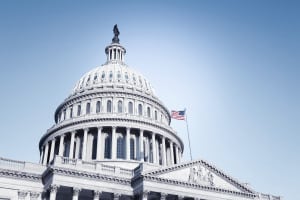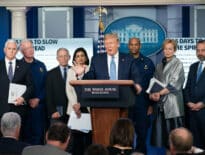Top congressional and White House officials say they expect to reach a deal Tuesday on a nearly $2 trillion measure aimed at easing the economic damage inflicted by the coronavirus pandemic.
Treasury Secretary Steven Mnuchin and Senate Democratic leader Chuck Schumer said they had spoken by phone with President Donald Trump during the long night of negotiations. While the two sides have resolved many issues in the sweeping package, some remain.
Ahead of the resumption of talks Tuesday morning, U.S. futures rose sharply after the leaders signaled resolution was in sight.
“We look forward to having a deal tomorrow,” Mnuchin told reporters after exiting Schumer’s office late Monday.
“The president is giving us direction,” Mnuhcin said. “The president would like to have a deal, and he’s hopeful we can conclude this.”
Moments later, Schumer agreed that a deal was almost within reach. “That’s the expectation – that we finish it tomorrow and hopefully vote on it tomorrow evening,” he said.
The long evening of shuttle negotiations came after a long day trying to close the deal. The massive package is a far-reaching effort to prop up the U.S. economy, help American households and bolster the health care system amid the growing crisis.
Democrats Say Bill has $500B ‘Slush Fund’
Tensions had flared Monday as Washington strained to respond to the worsening coronavirus outbreak, with Congress arguing over a nearly $2 trillion economic rescue package and an impatient Trump musing openly about letting the 15-day shutdown expire next Monday, March 30.
As the U.S. braces for an onslaught of sick Americans, and millions are forced indoors to avert a spike that risks overwhelming hospitals, the most ambitious federal intervention in modern times is testing whether Washington can act swiftly to deal with the pandemic on the home front.
Democrats are holding out as they argue the package is tilted toward corporations and should do more to help suddenly jobless workers and health care providers with dire needs.
In particular, Schumer, D-New York, wants constraints on the largely Republican-led effort to provide $500 billion for corporations, which Democrats have called a “slush fund.” Schumer wants the bill to limit stock buy-backs, CEO pay and layoffs.
Yet, he said, “We’re very close to reaching a deal.” Even so, another attempt to move the package forward snagged, blocked as Democrats refused to quit negotiating.
Democrats won one concession – to provide four months of expanded unemployment benefits, rather than just three as proposed, according to an official granted anonymity to discuss the private talks. The jobless pay also would extend to self-employed and so-called gig workers.
GOP Criticizes Push for Worker Protections
But Republicans complained Democrats were holding out for more labor protections for workers, wanting assurances that corporations taking federal aid will commit to retaining their employees.
Pelosi came out with the House Democrats’ own sweeping $2.5 trillion bill, which would provide $1,500 directly to the public and $200 billion to the states, as governors are pleading for aid. She urged Senate negotiators “to move closer to the values” in it.
Fuming, Senate Majority Leader Mitch McConnell warned Democrats — pointedly House Speaker Nancy Pelosi — to quit stalling on “political games,” as he described Democratic efforts to steer more of the aid toward public health and workers, and push other priorities.
“It’s time to get with the program, time to pass historic relief,” said an angry McConnell earlier in the day as he opened the chamber after a nonstop weekend session that failed to produce a deal. “This is a national emergency.”
Trump, who has largely been hands-off from the negotiations, weighed in late Monday from the White House briefing room, declaring that Congress should vote “for the Senate bill as written,” dismissing any Democratic proposal.
Package’s Core Components
Central to the economic rescue package is as much as $350 billion for small businesses to keep making payroll while workers are forced to stay home. The package also proposes a one-time rebate of about $1,200 per person, or $3,000 for a family of four, as well as extended unemployment benefits.
Hospitals would get about $110 billion for the expected influx of sick patients, said Mnuchin. But Democrats are pushing for more health-care dollars for the front-line hospitals and workers.
The urgency to act is mounting, as jobless claims skyrocket and financial markets are eager for signs that Washington can soften the blow of the health-care crisis and what experts say is a looming recession.
For most people, the new coronavirus causes only mild or moderate symptoms, such as fever and cough. For some, especially older adults and people with existing health problems, it can cause more severe illness, including pneumonia. The vast majority of people recover from the new virus. According to the World Health Organization, people with mild illness recover in about two weeks, while those with more severe illness may take three to six weeks to recover.




 |
| 


